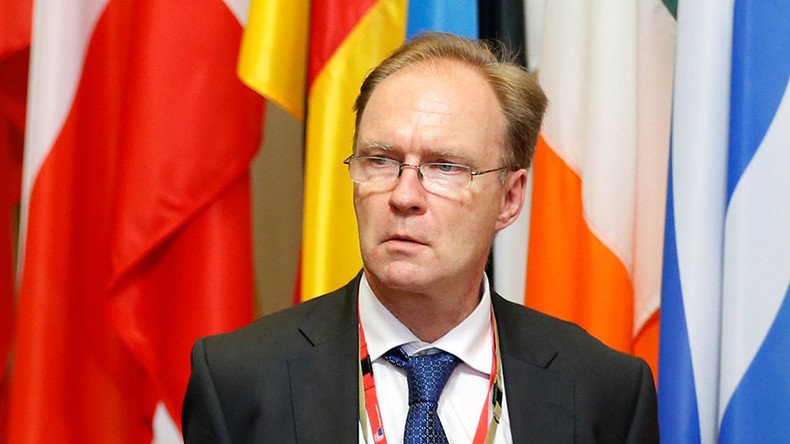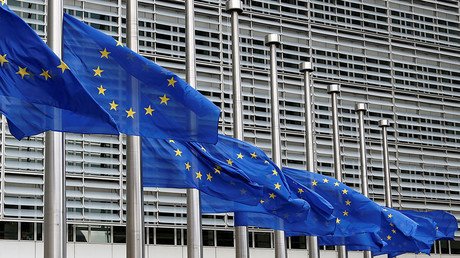Brexit bust-up: Resignation of Britain’s EU ambassador unleashes political storm

Sir Ivan Rogers could “not be trusted” as Britain’s EU ambassador and must be succeeded by a negotiator with a more positive view of Brexit, according to his critics.
Sir Ivan, who resigned on Tuesday, had been expected to play a key role in Brexit talks and was due to remain in his post until November. His supporters say the government’s Brexit plans have now been thrown into “chaos” without its most seasoned EU negotiator at the helm.
His resignation left “officials in shock over the loss of one of Britain’s most experienced EU negotiators,” according to the Financial Times, which broke the story.
Sir Ivan’s 1400-word leaked resignation letter to his staff reveals a thinly-veiled attack on the “muddled thinking” of UK Prime Minister Theresa May’s government. He said the UK is yet to resolve the structure of its negotiating team and still has no clear strategy to leave the EU.
He also appeared to confirm rumors he had been targeted for his “Brexit pessimism,” and urged staff to “challenge ill-founded arguments” and to “never be afraid to speak the truth to those in power.”
Here is the key paragraph in Sir Ivan Rogers' astonishing resignation email to his staff. It does not need much decoding. pic.twitter.com/AH3vtauWnM
— James Landale (@BBCJLandale) January 3, 2017
Sir Ivan’s abrupt departure appears to have infuriated Number 10, with government officials telling the Telegraph he “jumped before he was pushed.”
Conservative MP Iain Duncan Smith told Sky News that Sir Ivan “had to go” because civil servants should “ultimately” accept that ministers make the decisions.
He told Sky that Sir Ivan is “not God almighty,” adding: “Whatever their opinion, the job of the civil servant is to deliver on the will of the British people.”
Sir Ivan Rogers resignation is a good thing for Britain. He had become far to close to the EU Institutions to do his job properly.
— Paul Nuttall (@paulnuttallukip) January 4, 2017
Duncan Smith also claimed Rogers cannot be “trusted” by ministers because he allegedly leaked information to the press. He was referring to a “leak” to the BBC of Sir Ivan’s advice to May that it could take until the early to mid-2020s for the EU to agree and ratify a deal with Britain.
According to the Financial Times, Foreign Secretary Boris Johnson wants to replace Sir Ivan with someone who backs the Brexit cause “wholeheartedly” and with the “same attitude as the current government.”
Former UKIP leader Nigel Farage has also voiced his support for Sir Ivan’s resignation, saying the Foreign Office needs a “complete clear out.”
We need a complete clear out of the Foreign Office and our political class. pic.twitter.com/A3no90XbkW
— Nigel Farage (@Nigel_Farage) January 4, 2017
But Sir Simon Fraser, the former head of Diplomatic Service who worked with Sir Ivan, warned that Britain has lost one of its biggest experts on Europe, months before “very complex” Brexit negotiations begin.
He told the BBC: “He is a highly intelligent, knowledgeable and experienced official and one of the greatest experts, if I can use the expert word, that we have on European matters in the British Civil Service.
“You don’t appoint [ambassadors] for what they believe. You appoint them for what they know.”
Best Wishes to Sir Ivan Rogers, a much respected UK civil servant in Brussels - who knew what he was talking about.#Brexit
— Guy Verhofstadt (@GuyVerhofstadt) January 4, 2017
Brexit negotiations are not in disarray because Sir Ivan Rogers resigned: he resigned because they are in disarray. Blame Theresa May
— Richard Murphy (@RichardJMurphy) January 4, 2017
Sir Nicholas Macpherson, the permanent secretary at the Treasury from 2008 to 2016, said the loss of Sir Ivan could be the start of a “cull of the experts.” He told the Financial Times it “beggared belief” the government had dispensed Sir Ivan ahead of crucial Brexit talks.
Dave Penman, the head of the FDA, which represents permanent secretaries, has accused May of “sitting back” as Sir Ivan and the civil service as a whole are being criticized.
“It doesn’t surprise me that some politicians are calling for pro-Brexit civil servants to be appointed. What surprises me is the deafening silence from ministers who should be taking to the airwaves to defend the integrity and capability of the impartial civil service.”
May said the government will trigger Article 50, which begins the two-year Brexit negotiations, by the end of March 2017, meaning the UK will leave the EU by March 2019.













